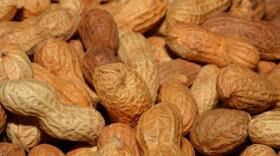It’s a sunny Saturday afternoon and you’re at a Braves game, Dudley Park, or maybe even a concert.
But no matter where you are, no summer experience is complete without the sweet sound of cracking open a flavorful peanut.
"The peanut that is produced in the United States is of the highest quality,” said Soraya Bertiolia senior research scientist at the University of Georgia.
She runs the UGA Wild Peanut Lab with her husband, David Bertioli.
“In terms of nutrition, in terms of quality and healthiness. We live in an amazing time in history,” David Bertioli said. But, even if this is a golden age for peanuts, the Bertiolis say there’s still room for improvement. Their mission is two-fold: investigate the genome structure of the peanut, and create a better peanut product overall. “We take wild peanuts and we cross them with cultivated peanuts," David Bertioli said.
The genetics are complex, let’s break down their research. The name of the game is cross selection, a breeding method. Wild peanut species from Brazil are used because of their adaptability. “They contain lots of genes, lots of alleles that helped them throughout the millennia adapt to the different stresses, to the different environments," Soraya Bertioli said. "We're certain to find genes that will help us make the peanuts here more adaptable, more resilient”
Of course, this doesn’t happen overnight. “Between the first cross and the cultivars release, it may take 10 years, which is actually quite fast for a breeding time,” she said. But, the wait is worth it, because the final product increases profitability and sustainability, “You don't have to, for instance, spray so much, you don't have to run the tractor around the field, which is burning up diesel. That all saves money,"
David Bertioli said. "Producing better peanuts is really a win all around for everybody, the environment, the farmer, and the consumer.” Even with the significant work they’ve already done, there’s always something new to investigate "It's a whole host of things that that can cause trouble farmers. So there's plenty of work to do," said David Bertioli.
Jessic Wurst reports.





